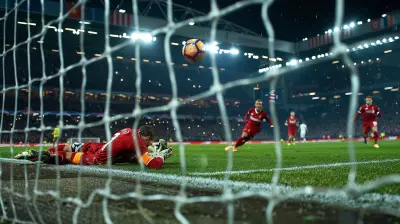How Injuries Have Altered World Championship Fates
3 June 2025
In the world of sports, championships are the ultimate goal. Athletes train their entire lives to reach the pinnacle of competition, with the dream of lifting that trophy or wearing that gold medal. But let’s face it, sports can be brutal. Sometimes, it's not just about talent or skill but about staying healthy. Injuries don't care about your dreams or how much work you've put in. They strike without warning and can completely change the course of history.
In the context of world championships, injuries have often been the one wild card that no one can predict. They can take down the most dominant athletes and give underdogs a chance to rise. Let’s take a dive into how injuries have altered the fates of world championships and left a lasting impact on the sports world.

The Fragility of Athletic Performance
When you think about it, sports are a game of millimeters and milliseconds. An athlete can spend years honing their craft, perfecting their efficiency, and pushing their body to the absolute limit. But the human body isn’t bulletproof. It's a finely-tuned machine, and like any machine, it can break down.One wrong twist, one awkward landing, and everything you've worked for can vanish in an instant. Injuries don’t discriminate — they strike legends just as easily as they take down rookies. And when it comes to world championships, injuries have a unique way of shifting the balance of power.

The Butterfly Effect of Injuries
You've probably heard of the butterfly effect before — the idea that small things can have massive consequences. In sports, injuries are the ultimate butterfly effect. One key player goes down, and suddenly, the entire dynamics of a team or competition changes.Just picture it: you’re watching a world championship match, and the star player gets injured. Suddenly, the team that was the favorite to win is scrambling to figure out how to fill the void. The competition, once a certain path to victory, is now wide open. It's like watching a house of cards collapse in slow motion.
Injuries don’t just affect the player; they affect the entire team, the opponent, and ultimately, the outcome of the championship.
Case Study: Derek Redmond – 1992 Olympics
One of the most heart-wrenching injury stories in world championship history has to be Derek Redmond's run in the 400m at the 1992 Olympics in Barcelona. Redmond was in peak form, a favorite to take home a medal. But midway through his semifinal race, disaster struck. His hamstring tore, and just like that, his hopes of winning a world title were gone.But what Redmond did next is what made the moment unforgettable. He refused to quit. Limping, in excruciating pain, he hobbled towards the finish line, eventually being helped by his father. The crowd roared in support, but it didn’t change the fact that an injury had robbed him of a chance at world championship glory.
Redmond’s story is a powerful reminder of how injuries can dramatically alter an athlete's fate and the course of a world competition. It also shows the raw, human side of sports — the determination, the heartbreak, and the unpredictability.
Case Study: Cristiano Ronaldo – 2016 UEFA European Championship
Sometimes, an injury doesn’t just affect one player; it affects an entire team. Remember the 2016 UEFA European Championship final between Portugal and France? Cristiano Ronaldo, arguably one of the best soccer players of all time, was expected to lead Portugal to victory.However, things took a sudden turn when Ronaldo was forced off the field in the first half after suffering a knee injury. It was a devastating blow for Portugal and Ronaldo personally. You could see the anguish on his face as he realized he couldn't continue.
Most people thought that was it for Portugal. Their star player was gone, and France, playing on home soil, seemed destined to win. But in a surprising turn of events, Portugal rallied together and won the championship in extra time. Ronaldo’s injury altered the dynamics of the game, but it also ignited a fire in his teammates to rise to the occasion.
This match is a perfect example of how an injury can change the narrative of a championship. In this case, it led to an unexpected hero emerging — Eder, who scored the winning goal for Portugal.

Injuries in Team Sports vs. Individual Sports
It’s worth noting that the impact of injuries varies between team sports and individual sports. In team sports, there’s a slight buffer. If one player goes down, there’s usually someone else who can step in, even if they’re not as skilled or experienced. But in individual sports, when an athlete gets injured, it’s game over. There’s no one to take their place, no one to carry the load.Take tennis, for example. If a player like Rafael Nadal pulls out of a Grand Slam due to injury, the entire tournament opens up. Suddenly, the competition looks very different. The same applies to track and field, swimming, and boxing.
In team sports, the stakes are still high, but the entire responsibility doesn’t fall on one person. However, if that injured player is the team’s star or captain, the psychological impact can be devastating.
Case Study: Kevin Durant – 2019 NBA Finals
In the 2019 NBA Finals, the Golden State Warriors were poised to secure another championship. But then, Kevin Durant, their star player, suffered a calf injury in the semifinals. He returned in Game 5 of the Finals but tragically tore his Achilles tendon, sidelining him for over a year.The Warriors lost the Finals to the Toronto Raptors, and many believe that if Durant had been healthy, the outcome could have been very different. His injury not only altered that particular championship but also had a ripple effect on the NBA landscape for years to come.
This is a classic example of how injuries in team sports can shift the balance of power. While the Warriors had other star players, Durant’s absence was too significant to overcome.

Psychological Toll of Injuries
While physical injuries are more obvious, the psychological toll they take on athletes is often overlooked. Imagine being at the top of your game, only to have it all come crashing down due to an injury. The mental anguish can be just as debilitating as the physical pain.Many athletes struggle with depression, anxiety, and feelings of isolation after getting injured. The fear of re-injury can also linger, making it hard for them to return to their previous level of performance.
For world champions, the pressure is even greater. Not only do they have to heal physically, but they also have to deal with the mental strain of knowing that their injury might have cost them a place in history. And in some cases, that window of opportunity never opens again.
Case Study: Serena Williams - 2017 Australian Open
Serena Williams is one of the greatest tennis players of all time, but even she has dealt with injuries that have altered her career trajectory. In 2017, she won the Australian Open while being eight weeks pregnant, a remarkable achievement.However, after giving birth later that year, Williams faced a series of injuries and complications that kept her from winning another Grand Slam title. While she has made several deep runs in tournaments since then, the injuries and time away from the game have taken their toll.
Williams’ story shows how injuries don’t just affect the present but can have long-term consequences on an athlete’s career. It’s a reminder that even the best in the world aren’t immune to the cruel hand of fate.
When Injuries Lead to New Champions
One of the most fascinating aspects of injuries in world championships is how they can pave the way for new champions to emerge. When the favorite is sidelined, it creates an opportunity for someone else to step up and claim the spotlight.This is the beauty of sports. No matter how much you predict or analyze, there’s always an element of the unexpected. Injuries are part of that unpredictability, and while they can be heartbreaking for the injured athlete, they also create opportunities for others.
Case Study: Tom Brady – 2001 NFL Season
Let’s rewind to the 2001 NFL season. The New England Patriots had an established quarterback in Drew Bledsoe, but when Bledsoe went down with a serious injury early in the season, a young, relatively unknown backup named Tom Brady stepped in.The rest, as they say, is history. Brady led the Patriots to a Super Bowl victory that year and went on to become one of the greatest quarterbacks of all time. If Bledsoe had never gotten injured, who knows what Brady’s career would have looked like?
This is a prime example of how an injury can change not just a championship but the entire landscape of a sport. One player's misfortune can become another player's golden opportunity.
Conclusion
Injuries are the ultimate game-changer in sports. They don’t care about your skill, your dedication, or your dreams. They strike when you least expect it, and their impact can be felt far beyond just the athlete who gets hurt. World championships, where the stakes are the highest, are often decided not just by talent but by who can stay healthy.Whether it’s a heartbreaking injury that robs an athlete of a once-in-a-lifetime opportunity or a setback that allows an underdog to rise, injuries have a way of altering the fate of world championships in ways we can’t predict. And that’s what makes sports so captivating — anything can happen, and no one’s fate is ever truly sealed.
all images in this post were generated using AI tools
Category:
World ChampionshipsAuthor:

Nelson Bryant
Discussion
rate this article
3 comments
Sierra Russell
Injuries in the World Championships are like plot twists in a soap opera—unexpected, dramatic, and everyone’s left asking, “Wait, who’s the villain here?” Let’s just hope it’s not my fantasy team!
June 19, 2025 at 11:41 AM

Nelson Bryant
Absolutely! Injuries definitely add an unpredictable layer to championships, keeping fans and teams on their toes. Let's hope for minimal impact on your fantasy team!
Faelith Jimenez
Injuries can reshape destinies, but they also reveal the resilience of athletes. Every setback paves the way for new champions to emerge, showcasing the true spirit of competition!
June 5, 2025 at 10:28 AM

Nelson Bryant
Thank you for your insightful comment! Injuries indeed challenge athletes and often lead to unexpected triumphs, highlighting their resilience and the spirit of competition.
Fern Bishop
Life’s a game of dodgeball—awkward injuries always steal the show!
June 5, 2025 at 4:42 AM

Nelson Bryant
Absolutely! Injuries can dramatically shift the dynamics of competition, often turning the unexpected into unforgettable moments.



